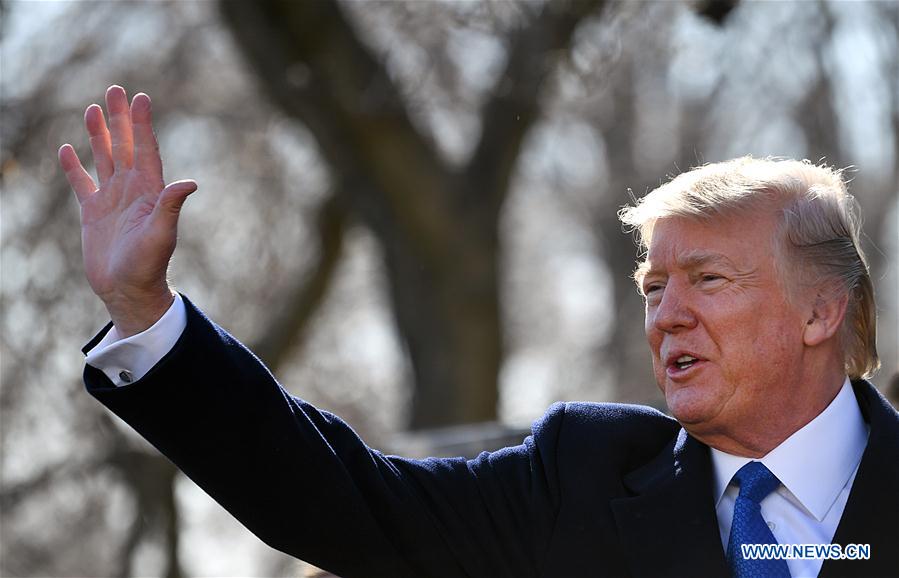Why has the US government shut down?
- By Jesse Anderson
 0 Comment(s)
0 Comment(s) Print
Print E-mail China.org.cn, January 22, 2018
E-mail China.org.cn, January 22, 2018

Last Friday, at the stroke of midnight, the U.S. government officially shut down, with Democrats and Republicans each blaming one another for the failure to prevent this very serious-sounding event. Indeed, "government shutdown" does have a somewhat apocalyptic ring to it. The general American public, however, is no doubt ignorant of what exactly the term means and, when it comes to deciding which political party is guilty of bringing it about, is likely to fall into partisan bias.
The reasons why the American government shuts down need to be laid out. At the most basic level, a shutdown occurs because the legislative branch - the Senate and the House of Representatives - fails to come to an agreement on the continued funding of the government. This can occur for various reasons, but at the heart of the current shutdown is a difference of opinion on immigration policy between the Republicans and the Democrats. In the case of an impending shutdown, the legislative branch can try to rush ahead with a lasting solution to the conflicts that have led to the threat of shutdown or they can pass a continuing resolution, which temporarily prolongs government funding in the hope that a long-term solution can be found before the resolution expires. If neither of these succeeds in being voted through, the government shuts down.
So, what occurs during a shutdown, really? Essentially, government employees that are considered "non-essential" are put on furlough, which means that they stop receiving their pay and are told to not come into work. But this isn't as bad as it sounds for the employees — after the last government shutdown in 2013, employees were paid retroactively for the days they missed. To give an idea of the shutdown's scope and how many people are affected by it, about 40 percent of all federal non-military employees are put on furlough.
Immigration is key to the current shutdown — specifically, the Deferred Action for Childhood Arrivals program, also known as DACA, which allows illegal immigrants who arrived in the U.S. as minors to remain in the country. Trump, claiming that the program was unconstitutionally instated by President Obama, cancelled DACA last year but said that he'd like to see it brought back by the legislative branch — his logic being that it should have been passed by the legislative branch in the first place.
DACA is set to expire in early March, and the Senate and the House have still failed to vote for its continuation. The Democrats, led by Senator Chuck Schumer, want to see it reinstated as soon as possible and were hoping that the reinstatement would be a part of the budget plan that failed to pass the Senate on Friday. Because it wasn't, most Democrats as well as four Republicans voted against it, and the government subsequently shut down.
Many Republicans have said that they want to see DACA brought back, but the party is also hoping to use the reinstatement of DACA as leverage to pass various immigration policies, such as the building of Trump's wall, restrictions on "chain migration" (when migrants bring family members into the country) and an end to the diversity lottery, which brings in immigrants from countries underrepresented in the U.S. By putting DACA's reinstatement into the funding bill, they would have lost a great deal of bargaining power in their pursuit of these policies.
So who's to blame for the shutdown? Trump has called it the "Schumer Shutdown," while Schumer has called it the "Trump Shutdown." It does, however, seem difficult to argue that the Democrats are not the responsible party. They, after all, are the ones who voted against the funding bill, and they did so admittedly over DACA. Furthermore, opinion polls have shown that the American public was more concerned with preventing a shutdown than with the immediate reinstatement of DACA. There still remains time before DACA expires, and Republicans have expressed their willingness to continue the program.
Ultimately, it seems like the Democrats will have a difficult time spinning this in their favor to non-partisan observers, and with 2018's coming Senate elections, that's not a good thing for them.
Jesse Anderson is a writer and translator originally from Seattle. He is currently based in Mexico City.
Opinion articles reflect the views of their authors, not necessarily those of China.org.cn.






Go to Forum >>0 Comment(s)